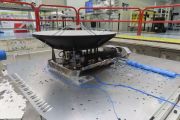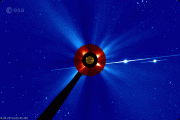
Copernical Team
Google unveils latest AI model, Gemini 2.0
 Google on Wednesday announced the launch of Gemini 2.0, its most advanced artificial intelligence model to date, as the world's tech giants race to take the lead in the fast developing technology.
CEO Sundar Pichai said the new model would mark what the company calls "a new agentic era" in AI development, with AI models designed to understand and make decisions about the world around you.
Google on Wednesday announced the launch of Gemini 2.0, its most advanced artificial intelligence model to date, as the world's tech giants race to take the lead in the fast developing technology.
CEO Sundar Pichai said the new model would mark what the company calls "a new agentic era" in AI development, with AI models designed to understand and make decisions about the world around you. Chengdu emerges as a hub for satellite components and aerospace innovation
 A state-of-the-art manufacturing base dedicated to commercial satellite components has commenced operations in Chengdu, Sichuan province. Once fully operational, the facility will have the capacity to support over 1,000 commercial satellites annually.
The project, situated in the Chengdu Future Science and Technology City, was developed by Beijing-based Aotian Technology. Specializing in h
A state-of-the-art manufacturing base dedicated to commercial satellite components has commenced operations in Chengdu, Sichuan province. Once fully operational, the facility will have the capacity to support over 1,000 commercial satellites annually.
The project, situated in the Chengdu Future Science and Technology City, was developed by Beijing-based Aotian Technology. Specializing in h A film capacitor that can take the heat
 The Department of Energy's Lawrence Berkeley National Laboratory (Berkeley Lab) and several collaborating institutions have successfully demonstrated a machine-learning technique to accelerate discovery of materials for film capacitors - crucial components in electrification and renewable energy technologies. The technique was used to screen a library of nearly 50,000 chemical structures to iden
The Department of Energy's Lawrence Berkeley National Laboratory (Berkeley Lab) and several collaborating institutions have successfully demonstrated a machine-learning technique to accelerate discovery of materials for film capacitors - crucial components in electrification and renewable energy technologies. The technique was used to screen a library of nearly 50,000 chemical structures to iden Hubble reveals stunning edge-on view of spiral galaxy
 The NASA/ESA Hubble Space Telescope has provided an extraordinary image of the spiral galaxy UGC 10043, located approximately 150 million light-years from Earth in the Serpens constellation. Viewed edge-on, this galaxy offers a rare perspective, with its spiral arms hidden from view, revealing a sharp profile against the cosmic backdrop.
In this edge-on orientation, UGC 10043's disk appear
The NASA/ESA Hubble Space Telescope has provided an extraordinary image of the spiral galaxy UGC 10043, located approximately 150 million light-years from Earth in the Serpens constellation. Viewed edge-on, this galaxy offers a rare perspective, with its spiral arms hidden from view, revealing a sharp profile against the cosmic backdrop.
In this edge-on orientation, UGC 10043's disk appear NASA performs first aircraft accident investigation on another world
 Engineers from NASA's Jet Propulsion Laboratory in Southern California and AeroVironment are completing a detailed assessment of the Ingenuity Mars Helicopter's final flight on Jan. 18, 2024, which will be published in the next few weeks as a NASA technical report. Designed as a technology demonstration to perform up to five experimental test flights over 30 days, Ingenuity was the first aircraf
Engineers from NASA's Jet Propulsion Laboratory in Southern California and AeroVironment are completing a detailed assessment of the Ingenuity Mars Helicopter's final flight on Jan. 18, 2024, which will be published in the next few weeks as a NASA technical report. Designed as a technology demonstration to perform up to five experimental test flights over 30 days, Ingenuity was the first aircraf It's an Asteroid, it's a Comet, it's the Geminids Meteor Shower!
 The Geminids meteor shower is back for its annual December show of beautiful bright and fast meteors. The Geminids, which will peak on the night between Dec 13 - 14 in 2024, is considered to be one of the best and most reliable annual meteor showers.
h3>Where Did the Geminids Originate and What Makes it Different? /h3>
The debris causing the Geminids originated from an asteroid known as
The Geminids meteor shower is back for its annual December show of beautiful bright and fast meteors. The Geminids, which will peak on the night between Dec 13 - 14 in 2024, is considered to be one of the best and most reliable annual meteor showers.
h3>Where Did the Geminids Originate and What Makes it Different? /h3>
The debris causing the Geminids originated from an asteroid known as China successfully tests XZY 1 verification rocket engine
 China's XZY 1 verification rocket has successfully completed a static firing test at Haiyang Oriental Aerospace Port in Shandong province, marking a major milestone for the nation's aerospace innovation.
Developed by Beijing Jianyuan Technology Co Ltd, also known as Space Epoch, the XZY 1 is a medium-lift launch vehicle with a stainless steel body powered by liquid oxygen-methane engines.
China's XZY 1 verification rocket has successfully completed a static firing test at Haiyang Oriental Aerospace Port in Shandong province, marking a major milestone for the nation's aerospace innovation.
Developed by Beijing Jianyuan Technology Co Ltd, also known as Space Epoch, the XZY 1 is a medium-lift launch vehicle with a stainless steel body powered by liquid oxygen-methane engines. Undeterred by Friday the 13th, SpaceX plans pair of launches
 SpaceX plans to launch 23 Starlink communications satellites into low-Earth orbit from Vandenberg Space Force Base in California Friday morning, weather permitting.
The planned 11:28 a.m. PT liftoff will be the first of a pair of SpaceX launches scheduled for Friday the 13th. The other will carry a GPS navigation satellite into orbit from Cape Canaveral Space Force Station in Florida so
SpaceX plans to launch 23 Starlink communications satellites into low-Earth orbit from Vandenberg Space Force Base in California Friday morning, weather permitting.
The planned 11:28 a.m. PT liftoff will be the first of a pair of SpaceX launches scheduled for Friday the 13th. The other will carry a GPS navigation satellite into orbit from Cape Canaveral Space Force Station in Florida so ESA to collaborate with ISRO on Gaganyaan missions
 On December 4, 2024, the European Space Agency (ESA) and the Indian Space Research Organisation (ISRO) formalized an agreement that establishes ESA's support for India's Gaganyaan human spaceflight program. This collaboration will leverage ESA's ground station capabilities to aid ISRO's ambitious mission to send humans into space.
Gaganyaan is India's inaugural human spaceflight initiative
On December 4, 2024, the European Space Agency (ESA) and the Indian Space Research Organisation (ISRO) formalized an agreement that establishes ESA's support for India's Gaganyaan human spaceflight program. This collaboration will leverage ESA's ground station capabilities to aid ISRO's ambitious mission to send humans into space.
Gaganyaan is India's inaugural human spaceflight initiative NASA's crew capsule had heat shield issues during Artemis I - an aerospace expert on these critical spacecraft components
 Off the coast of Baja California in December 2022, sun sparkled over the rippling sea as waves sloshed around the USS Portland dock ship. Navy officials on the deck scrutinized the sky in search of a sign. The glow appeared suddenly.
A tiny spot at first, it gradually grew to a round circle falling at a great speed from the fringes of space. It was NASA's Orion capsule, which would soon en
Off the coast of Baja California in December 2022, sun sparkled over the rippling sea as waves sloshed around the USS Portland dock ship. Navy officials on the deck scrutinized the sky in search of a sign. The glow appeared suddenly.
A tiny spot at first, it gradually grew to a round circle falling at a great speed from the fringes of space. It was NASA's Orion capsule, which would soon en 



































